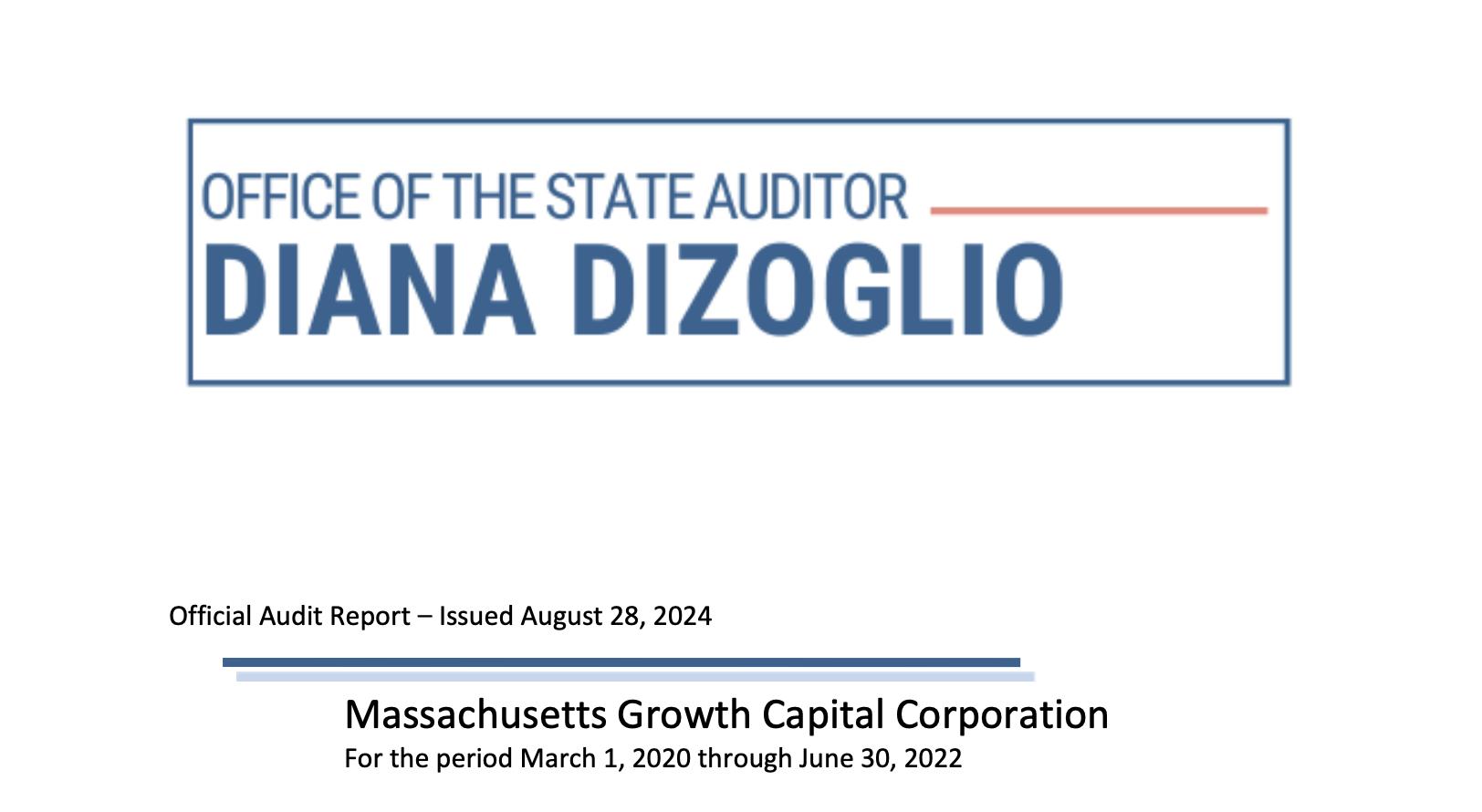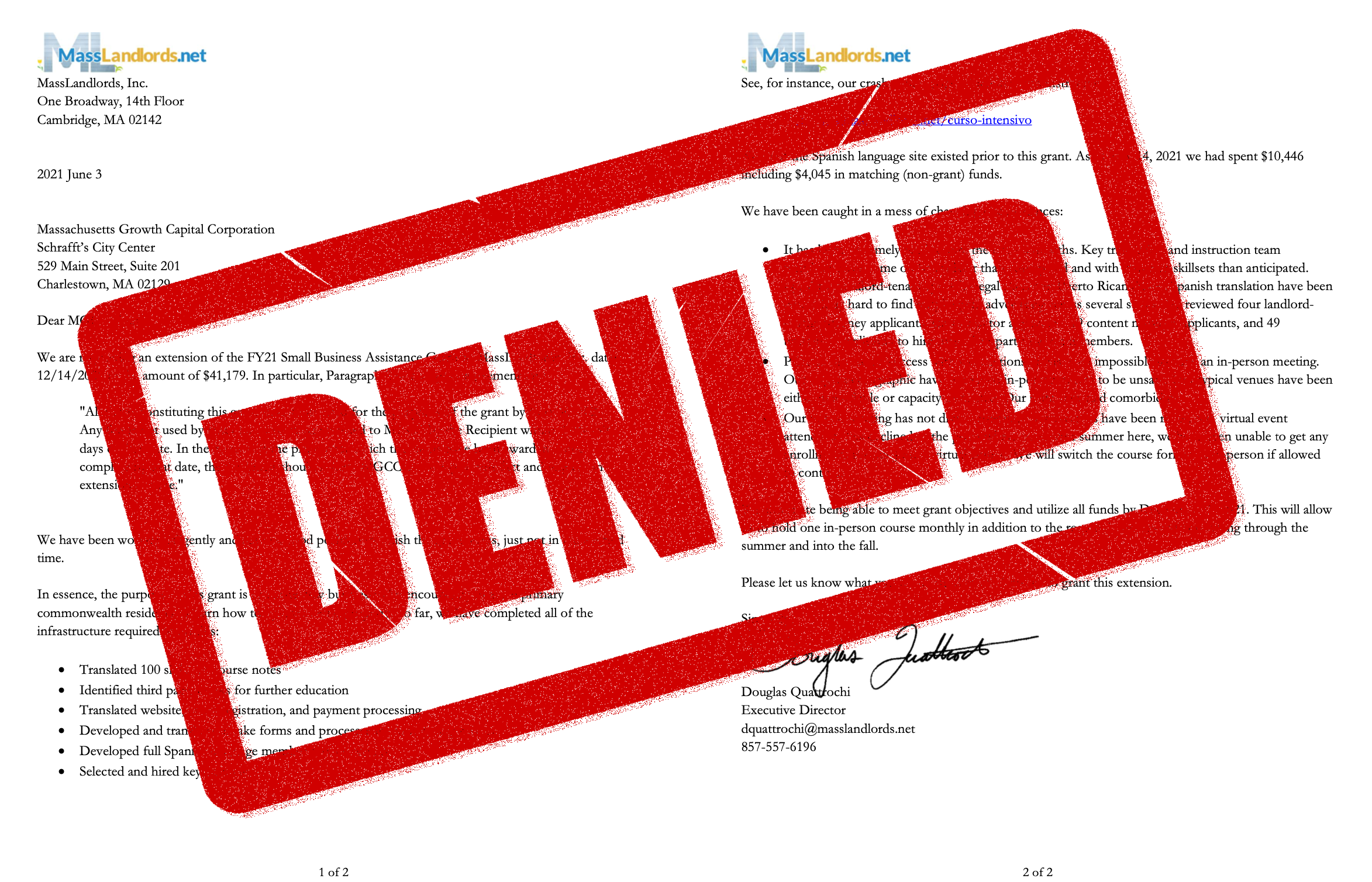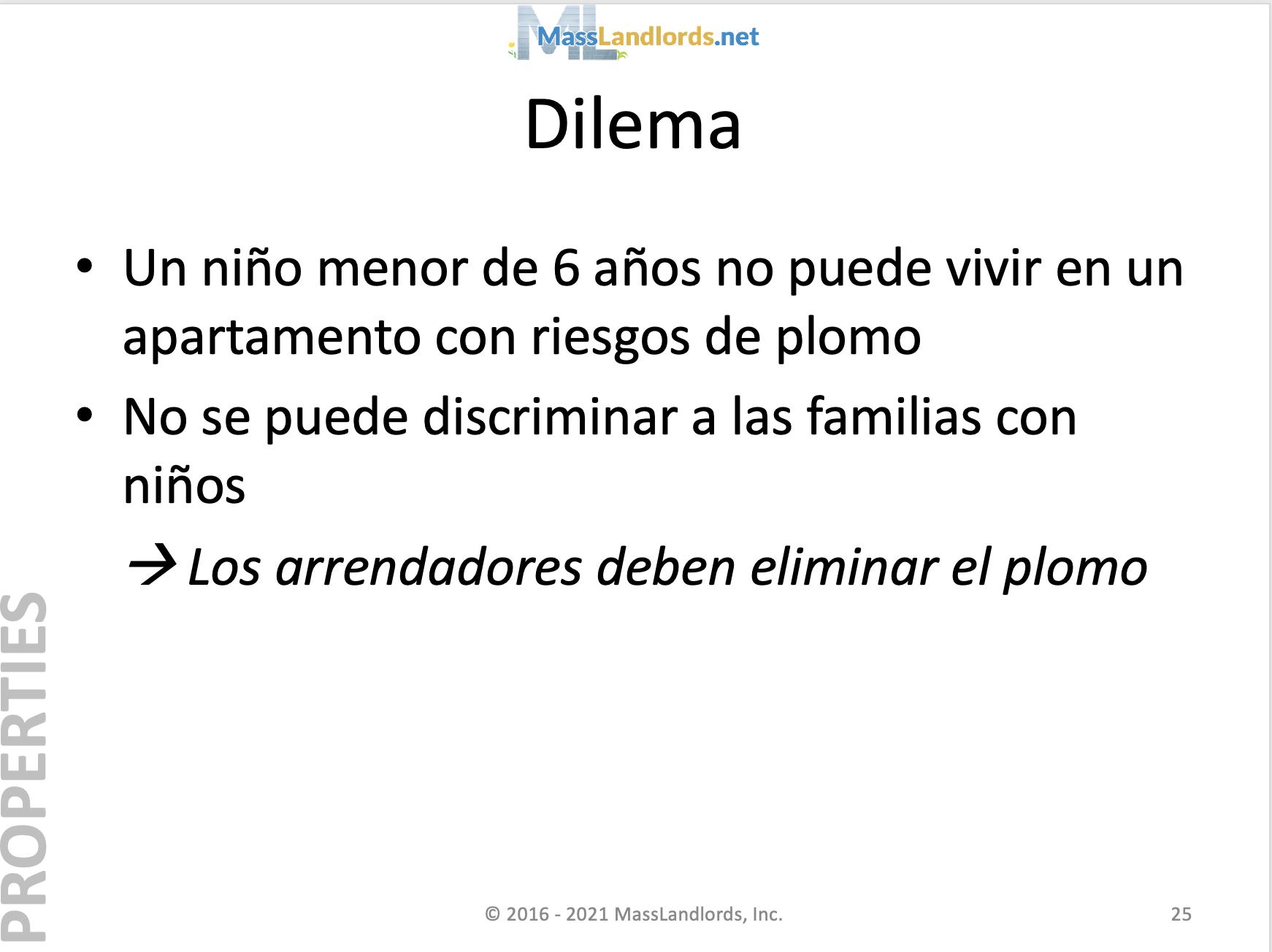State Auditor Finds Mass. Growth Capital Corp. Missed Mark on Covid Appropriations; MassLandlords Impacted
. Posted in News - 0 Comments
By Kimberly Rau, MassLandlords, Inc.
A 2024 performance audit of the Massachusetts Growth Capital Corporation (MGCC) for the period of March 2020 through June 2022 revealed that the group did not always effectively, or appropriately, manage grant funds meant to help small businesses during the Covid-19 pandemic. This includes distributing grant money to businesses that should not have been eligible for funding under the program’s restrictions, and sometimes awarding funds far in excess of what a business should have received.

The cover of the 2024 State Auditor’s report for the Massachusetts Growth Capital Corporation (Image: Public Domain)
State auditor Diana DiZoglio conducted the audit and released her report in August 2024. The report includes her findings and recommendations, as well as responses offered by MGCC. This article will focus primarily on the misappropriation of grant funding.
The audit also showed that MGCC lost track of more than $50,000 in assistance funds, slightly more than the amount MassLandlords received from them for a different grant, that we were forced to return. We’ll touch on that in this article as well.
What is the Massachusetts Growth Capital Corporation?
MGCC was created in 2010 and is part of the Executive Office of Economic Development (EOED). Its goal, according to the MGCC website, is to empower “small business through financing and managerial assistance to create economic opportunities for all.” It further states that it provides and supports “inclusive business resources” to organizations throughout Massachusetts.
MGCC works with local lending institutions, community groups and other nonprofits to help finance projects that lead to job growth in economically distressed communities. It also provides access to loans when groups are unable to secure more traditional financing, and manages a grant program that helps small businesses access training and technical assistance.
Pandemic Dollars Meant to Help Small Businesses
In response to the Covid-19 pandemic, MGCC received more than $750 million through eight federally funded contracts in fiscal year 2021. By the end of 2022, MGCC had received $751,856,500 from those contracts, and had distributed $702,754,582 to approximately 15,000 small businesses in Massachusetts.
Notably, from those grants, MGCC administered the Covid-19 Small Business Relief Grant Program (SBRGP), funded by two of those eight contracts. One contract totaled $650 million, the other, $17.5 million.
The SBRGP was specifically to help small businesses shoulder the burden of lost revenue due to Covid-19, and help preserve jobs. Eligible businesses could receive grants totaling three months of operating expenses or $75,000, whichever was less.
MGCC was instructed to score applications and award additional points to businesses that met one or more of the following criteria: businesses that served a gateway city; were owned by people of color, women or veterans; had not yet received any Covid-19 assistance; or were from sector-specific industries such as bars, restaurants, retail establishments, hair salons and barbershops.
To qualify, businesses had to be located in Massachusetts and part of an eligible industry. They had to be able to prove a loss of income related to Covid-19 that was equal or greater to the amount of requested funding. Further, the business had to have been established prior to 2019 and still be in operation, and needed to be in good standing with taxes and any applicable licenses and registrations.
MGCC received 19,070 applications for SBRGP funding and awarded grants to 14,066 applicants from 324 Massachusetts cities and towns. Applications were accepted during an eight-month period from October 2020 through June 2021. The last payments were disbursed in July 2021. Applications were reviewed at each stage (eligibility, application and approval), and an MGCC financial analyst also reviewed completed applications for any disqualifying issues or fraud.
“Rounding Method” Misappropriates Thousands in Covid Assistance
During her audit, DiZoglio obtained the list of SBRGP recipients and chose a random sample of 60 businesses that received funding through the program. The auditing team reviewed the applications, tax records, electronic transfers and bank statements for each sample recipient.
Of those 60 recipients, the audit revealed that 18 received grants (30%) were not limited to the lesser of 3 months’ expenses or $75,000. In those 18 instances, the grant amounts totaled $540,000, which was more than $80,000 over what should have been granted. For instance, one business received $60,000 when it was only entitled to $50,419.50. Another received $30,000 when it should have gotten $26,508. And in the most egregious example, a business that should have gotten only $5,161 received $20,000.
An MGCC email to the state auditor in June 2023 stated that MGCC “rounded up” requests “based on the ongoing pandemic and the continued negative impacts on small business.”
The auditor’s report noted that they had not been able to find any documented policy that allowed for said rounding. They also did not find any methodology as to when, or how, to round up.
“We noted that the contract overages did not follow a consistent pattern, which would be expected from rounding,” the auditor’s report stated, “especially given the example of a $5,161 grant being rounded up to $20,000.”
Grants for Small Businesses Awarded to Franchises
The Covid-19 SBRGP grant money was intended for small businesses, not larger companies. Still, the audit revealed that nine grants, totaling $660,000, went to businesses that were parts of chains or franchises. MGCC stated that was the result of the applicants neglecting to provide that information on their applications.
“During the pandemic, self-attestation was a common method for the federal government to ensure that assistance reached those in need as expediently as possible,” MGCC wrote in its response to the findings, which were published in the audit report.
However, the auditor report suggests MGCC could have done more.
“[V]arious procedures exist to check for program eligibility in a timely manner,” the report states. “For example, if MGCC performed an analysis of potential grantees with out-of-state legal business addresses before issuing grant payments, it could have potentially identified some ineligible applicants.”
Cyber Security Also Proves Issue for MGCC Employees
A section toward the end of the report details a non-financial misstep that could have proved dangerous in the event of a security breach.
There were 10 MGCC employees responsible for managing and accounting for SBRGP funds during the audit period, but the audit uncovered that none of them received any information about security training. MGCC does have a written information security policy (WISP) that calls for information security training, but it was not implemented.
“A lack of such training may lead to user error or compromise the integrity and security of MGCC’s information systems, such as MGCC’s accounting system, which was used to administer approximately $650 million in Covid-19 SBRGP funding,” the auditor’s report reads.
MGCC pointed to the “rapid pace” of hiring new and temporary staff during the pandemic, along with the requirement that employees work from home. They have since provided the required training.

MGCC had reports due the same day as our deadline to use grant funds. We requested an extension ahead of time. They submitted their report late with incomplete information. Our request was denied. (Lic: CC by SA 4.0 MassLandlords, Inc.)
Reports Not Filed by Required Dates; $54,000 Missing
The two final points in the audit report indicate that MGCC did not file SBRGP reports by the required dates, and did not include all the required information. This includes an initial financial and program report, which was 16 days late and did not include information on program outcomes.
MGCC stated in response that the outcomes were not included because not enough time had elapsed to properly measure them. For example, outcomes such as job retention and economic impact could not be measured until all grant funds had been used by the businesses. According to MGCC, the final report was late because the final SBRGP payment was made after the report’s due date of June 30, 2021.
Finally, the audit revealed that MGCC had an unreconciled variance of $54,324 in SBRGP funds.
“This variance consists of funding that MGCC had not disbursed as grants or returned to the state, and MGCC could not explain this variance,” the report states.
MGCC responded that the deviation was due to the fact that the initial amounts logged in were estimates, and were subject to change based on further discussion.
“As noted, MGCC’s final and official close-out for the Covid-19 SBRGP reconciled program funds received with program funds disbursed without any deviations,” they wrote.
The auditor’s report stated their office was planning to conduct a post-audit review that would allow them to further examine the reconciliation.

“A child under the age of 6 cannot live in an apartment with lead hazards. You cannot discriminate against families with children. Lessors must eliminate lead.” One of the many portions of our Crash Course in Landlording that we were translating into Spanish before MGCC took our grant money back. (Image: CC by SA 4.0 MassLandlords, Inc.)
MassLandlords’ History With MGCC
In 2020 (fiscal year 2021), MGCC offered Massachusetts small businesses with fewer than 20 employees technical assistance grants. MassLandlords applied for, and received, a grant in the amount of $41,179 to translate our Crash Course in Landlording into Spanish.
“The purpose of this grant is to create new business by encouraging Spanish primary commonwealth residents to learn how to operate rental property,” we wrote to MGCC.
All funds had to be used by June 30, 2021. If not, recipients were to write in to MGCC and request an extension.
By May 2021, we had used just under $10,500 of the grant we were awarded. This was primarily because MGCC awarded the funds six months into the fiscal year, leaving us half of the time requested in our grant to complete the project. We faced many obstacles in attempting to reach our goal, including difficulties finding and hiring qualified translators. Attendance was down due to a lack of in-person meetings prior to vaccinations. And virtual meetings were slow to take off.
We wrote to request an extension, stating we expected to be able to complete the project by Dec. 31, 2021. We showed that we had successfully hired two translators and two course instructors and were ahead of schedule and under budget given our six-month delayed start.
Instead of receiving an extension (which MGCC should have been open to, considering their own inability to meet the exact same deadline for reports), MassLandlords was ordered to return the funds. When we asked what we could do next time to ensure we could retain the grant, MGCC’s then-president and CEO Larry Andrews informed Executive Director Doug Quattrochi that “there will be no ‘next time’ for MassLandlords.”
Andrews informed Quattrochi that MassLandlords was not the right kind of nonprofit, and that MGCC was not interested in funding real estate investors or house flippers. Even when informed that house flipping was not remotely within the scope of MassLandlords’ mission, MGCC refused to allow us to continue with our Spanish translation project. We returned the funds.
Perhaps if we had used the MGCC “rounding method” to turn our $10,400 in used funds into $41,000 on the report, we would have been able to continue our mission. Our apparently solo desire to remain in compliance with rules and statute when MGCC itself was unable to cost us the opportunity to reach more people.
Conclusion
The height of the Covid-19 pandemic was an uncertain, stressful time for most everybody, and this of course includes people who worked for government agencies.
However, $700 million is no small chunk of change, and it’s imperative that the people overseeing such sums have systems in place to ensure that money is securely handled, and fairly and accurately awarded. In some cases, it appears systems were in place, but were disregarded, such as the bizarre “rounding” determinations.
In other cases, it appears the chaos surrounding many new employees resulted in a lack of oversight toward procedures such as internet security. That may seem like a minor thing, but if there had been a security breach, almost a billion dollars would have been at stake, along with lots of sensitive information for thousands of Massachusetts businesses.
If we hadn’t had our own negative experiences with MGCC, perhaps we would be more inclined to think these misappropriations and oversights were purely a result of the pandemic. But since we were incorrectly lumped in with “house flippers,” at which point no further discussion or clarification was entertained, we have to wonder if there’s any true oversight at all happening within MGCC.
In the end, though, MGCC has had its independence revoked by the recent economic development bill, which rolled it into the Massachusetts Development Finance Agency (“MassDevelopment”). Also, according to an October post on LinkedIn, Larry Andrews was “seeking a new role and would appreciate your support.” MassLandlords fully supports Mr. Andrews seeking a new role, preferably away from public funds.




